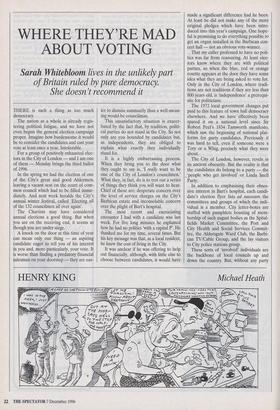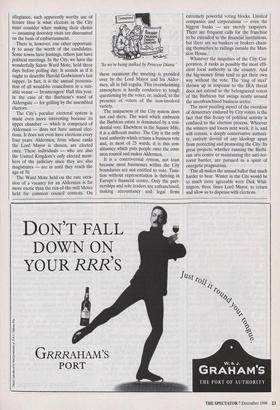WHERE THEY'RE MAD ABOUT VOTING
Sarah Whitebloom lives in the unlikely part
of Britain ruled by pure democracy.
She doesn't recommend it
THERE is such a thing as too much democracy.
The nation as a whole is already regis- tering political fatigue, and we have not even begun the general election campaign proper. Imagine how burdensome it would be to consider the candidates and cast your vote at least once a year. Intolerable.
For a group of positively exhausted elec- tors in the City of London — and I am one of them — Monday brings the third ballot of 1996.
In the spring we had the election of one of the City's great and good Aldermen, leaving a vacant seat on the court of com- mon council which had to be filled imme- diately. And next week heralds the City's annual winter festival, called 'Electing all of the 132 councilmen all over again'.
The Chartists may have considered annual elections a good thing. But when you are on the receiving end, it seems as though you are under siege.
A knock on the door at this time of year can mean only one thing — an aspiring candidate eager to tell you of his interest in you and, more particularly, your vote. It is worse than finding a predatory financial salesman on your doorstep — they are eas- ier to dismiss summarily than a well-mean- ing would-be councilman.
This unsatisfactory situation is exacer- bated by the fact that, by tradition, politi- cal parties do not stand in the City. So not only are you hounded by candidates but, as independents, they are obliged to explain what exactly they individually stand for.
It is a highly embarrassing process. When they bring you to the door what they ought to say is, 'I really want to be one of the City of London's councilmen.' What they, in fact, do is to trot out a series of things they think you will want to hear. Chief of these are: desperate concern over the level of service charges on the City's Barbican estate and inconsolable concern over the plight of Bart's hospital.
The most recent and excruciating encounter I had with a candidate was last week. For five long minutes he explained how he had no politics 'with a capital P'. He thanked me for my time, several times. But his key message was that, as a local resident, he knew the cost of living in the City.
It was unclear if he was offering to help out financially, although, with little else to choose between candidates, it would have made a significant difference had he been. At least he did not make any of the more original pledges which have been intro- duced into this year's campaign. One hope- ful is promising to do everything possible to get an organ installed in the Barbican con- cert hall — not an obvious vote-winner.
That my caller professed to have no poli- tics was far from reassuring. At least elec- tors know where they are with political parties, so when the blue, red or orange rosette appears at the door they have some idea what they are being asked to vote for. Only in the City of London, where tradi- tions are not traditions if they are less than 800 years old, is 'independence' a prerequi- site for politicians.
The 1972 local government changes put paid to this feature of town hall democracy elsewhere. And we have effectively been spared it on a national level since Sir Robert Peel's 1834 Tamworth manifesto, which saw the beginning of national plat- forms for party candidates. Previously it was hard to tell, even if someone were a Tory or a Whig, precisely what they were about.
The City of London, however, revels in its ancient obscurity. But the reality is that the candidates do belong to a party — the ;people who get involved' or Linda Snell Party.
In addition to emphasising their obses- sive interest in Bart's hospital, each candi- date's election flyer lists ad nauseam the committees and groups of which the indi- vidual is a member. City letter-boxes are stuffed with pamphlets boasting of mem- bership of such august bodies as the Spital- fields Market Committee, the Port and City Health and Social Services Commit- tee, the Aldersgate Ward Club, the Barbi- can TV/Cable Group, and the lay visitors to City police stations group.
These sorts of 'involved' individuals are the backbone of local councils up and down the country. But, without any party allegiance, such apparently worthy use of leisure time is what electors in the City must consider when making their choice — assuming doorstep visits are discounted on the basis of embarrassment.
There is, however, one other opportuni- ty to assay the worth of the candidates. Some towns have hustings, others just have political meetings. In the City, we have the wonderfully Saxon Ward Mote, held three days before polling day. It sounds as if it ought to describe Harold Godwinson's last supper. In fact, it is the annual presenta- tion of all would-be councilmen in a suit- able venue — Ironmongers' Hall this year, in the case of the Barbican's ward of Aldersgate — for grilling by the assembled electors.
The City's peculiar electoral system is made even more interesting because its upper chamber — which is comprised of Aldermen — does not have annual elec- tions. It does not even have elections every four years. Aldermen, from whose ranks the Lord Mayor is chosen, are elected once. These individuals — who are also the United Kingdom's only elected mem- bers of the judiciary since they are also magistrates — are in until they reach the age of 70.
The Ward Mote held on the rare occa- sion of a vacancy for an Alderman is far more exotic than the run-of-the-mill Motes held for common council contests. On 'So we're being stalked by Princess Diana.'
these occasions the meeting is presided over by the Lord Mayor and his Alder- men, all in full regalia. This overwhelming atmosphere is hardly conducive to tough questioning by the voter, or, indeed, to the presence of voters of the non-involved variety.
The uniqueness of the City system does not end there. The ward which embraces the Barbican estate is dominated by a resi- dential vote. Elsewhere in the Square Mile, it is a different matter. The City is the only local authority which retains a business vote and, in most of 25 wards, it is this con- stituency which puts people onto the com- mon council and makes Aldermen.
It is a controversial system, not least because most businesses within the City boundaries are not entitled to vote. Taxa- tion without representation is thriving in Europe's financial centre. Only the part- nerships and sole traders are enfranchised, making accountancy and legal firms extremely powerful voting blocks. Limited companies and corporations — even the biggest banks — are merely taxpayers. There are frequent calls for the franchise to be extended to the financial institutions, but there are no bankers or brokers chain- ing themselves to railings outside the Man- sion House.
Whatever the iniquities of the City Cor- poration, it ranks as possibly the most effi- cient local authority in the country. And the big-money firms tend to get their own way without the vote. The 'ring of steel' thrown up in response to the IRA threat does not extend to the beleaguered voters of the Barbican but swings neatly around the unenfranchised business sector.
The most puzzling aspect of the overdose of democracy endured by City voters is the fact that this frenzy of political activity is confined to the election process. Whoever the winners and losers next week, it is, and will remain, a deeply conservative authori- ty, entirely devoid of any ideology apart from protecting and promoting the City. Its great projects, whether running the Barbi- can arts centre or maintaining the anti-ter- rorist barrier, are pursued in a spirit of energetic pragmatism.
This all makes the annual ballot that much harder to bear. Winter in the City would be so much more agreeable were Dick Whit- tington, three times Lord Mayor, to return and allow us to dispense with elections.



















































































 Previous page
Previous page